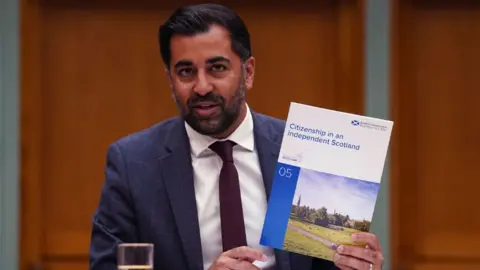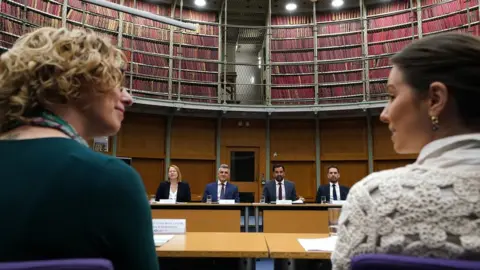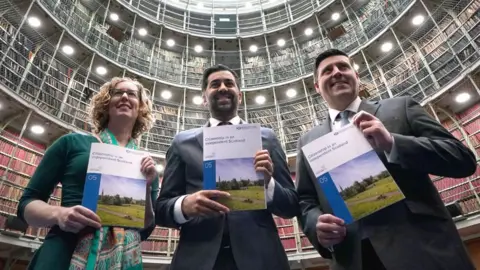Humza Yousaf reveals Scots citizenship and passport plan
 PA Media
PA MediaFirst Minister Humza Yousaf has unveiled plans for citizenship and passports in an independent Scotland.
A new Scottish government paper sets out proposals on migrants' rights and freedom of movement in the event that the country leaves the union.
The prospectus is the fifth in the Building a New Scotland series, which was launched by former first minister Nicola Sturgeon last year.
Opposition MSPs have labelled the plans a waste of taxpayers' money.
Speaking at launch event in Edinburgh attended by "New Scots" including Ukrainian and Syrian refugees, Mr Yousaf said a move to a more "inclusive" Irish-style citizenship system would be beneficial morally and economically.
He told BBC Scotland it would address "barriers" facing those seeking citizenship and help to halt a decline in Scotland's working-age population.
The new paper, called Citizenship in an independent Scotland, proposes that Scotland would allow those born outside the country after independence to be automatically entitled to Scottish citizenship, if at least one of their parents is a Scottish citizen.
It also outlines the rights of British citizens to claim dual nationality at the point of independence and set out proposals to make it easier for those from overseas to apply for Scottish citizenship.
The paper proposes that Scotland would remain part of the Common Travel Area after independence, allowing British and Irish citizens to live and work in Scotland without restrictions, while Scottish citizens would retain those same rights in the UK and in Ireland.
 PA Media
PA MediaThe government claims that the Common Travel Area arrangements would mean there would be no new passport or immigration checks at any of Scotland's land, sea or air borders with the UK.
The first minister dismissed concerns about such an arrangement, pointing to EU member Ireland's current relationship with the UK under the Common Travel Area.
He added: "If Scotland has a really open, inclusive model of citizenship that allows people to come here to work, to be part of society, to contribute, why on earth would they want to move away from Scotland?"
Mr Yousaf insisted the Scottish government had spent a "fraction" of the £3 billion he said it spends every year on "mitigating the effects of Westminster austerity and the cost of living crisis".
"These papers are important because we were elected, of course, with a mandate for a referendum and to make that positive case for independence," the SNP leader said.
Scottish passport
According to the proposals, Scottish citizens would have the right to a Scottish passport, which they should be able to apply for and receive by the first day of independence.
The paper says that any valid UK passports would continue to be recognised in Scotland until their expiry date, stating it would not be a requirement of Scottish citizenship to hold a Scottish passport.
The passports, which would be a burgundy red colour, would follow EU standards for international travel documents and would be available in lengths of five years for children and ten years for adults, it is proposed.
The government reiterated its ambition for Scotland to rejoin the EU and set out how it proposes to safeguard the rights of EU citizens.
The document says their rights would be upheld in line with the protections of the EU-UK Withdrawal Agreement "until such time as they can exercise their reciprocal EU treaty rights to free movement in Scotland once again".
 PA Media
PA MediaPrevious Building a New Scotland papers have discussed plans to set up a formal constitution and argued comparable independent countries to Scotland are "wealthier and fairer than the UK".
Other papers laid out economic proposals and said democracy can be "renewed" with independence.
In response to the latest prospectus launch, Scottish Labour constitution spokesperson Neil Bibby said the Scottish government was "distracted by its constitutional obsession".
Scottish Conservatives constitution spokesperson Donald Cameron said the publication was a "blatant misuse of public money and resources by the SNP".
Scottish Liberal Democrat communities spokesperson Willie Rennie also criticised the use of government time and money for something that "just isn't going to happen".
The paper was launched amid a dispute over Scottish government ministers using civil service staff to develop policy in reserved areas.
Cabinet Office minister Lucy Neville-Rolfe told the Lords this week that "sanctions" for Scottish ministers would be considered as part of a review of the Cabinet Manual, which codifies the conduct and operation of government and civil servants.
Labour peer George Foulkes suggested Scottish ministers could face financial penalties and told BBC Radio's Good Morning Scotland the UK "was never meant to be a union of equal partners".
But Robert Hazell, a professor of government and the constitution at University College London who was involved in compiling the Cabinet Manual, told BBC Scotland it was "perfectly proper" for civil servants to work on the Scottish government's agenda.
SNP MP Tommy Sheppard told BBC Scotland: "No unelected Lord or UK minister will dictate how our democratic institution operates."


Your passport is a key to your identity.
It's the one document that really links you to the state you belong to - or don't want to belong to.
My passport is a few years old and a bit worn.
There are three key trigger phrases for anyone who follows the Scottish constitutional debate: "United Kingdom", "European Union" and "Her Britannic Majesty" - the current state, Brexit and the future of the monarchy.
The Scottish government event was all about citizenship - the people who hold the passport of an independent Scotland.
The aim is to follow the Irish model - those born outwith the country after independence will be entitled to Scottish citizenship, if one of their parents is a citizen here.
That's the same as the 2013 independence white paper almost ten years ago - it said the birth must be registered in Scotland to take effect.
There's nothing surprising here - but there is a real emphasis that this is necessary for a stronger economy with more people working for good public services.
The policy is welcoming of "New Scots". Tie that in with a critique of Westminster migration policies and a strong dose of pro-EU rhetoric, it's a frequent flyer for anyone covering this beat.
Questioned if a "watered-down" Scottish citizenship would lead to back door migration to the rest of the UK - the first minister turned the argument on its head, saying if there's an open and inclusive model why would they want to move away from Scotland?
These papers are often launched on sluggish news days when parliament is on holiday - guaranteeing a good bit of news coverage.
It feeds into the critique from the opposition that the Scottish government shouldn't be "wasting" money on this - particularly after the Supreme Court ruling last autumn that said aspects of the constitution are reserved.
The Conservatives believe a line should now be drawn but the SNP resist, portraying that as a further squeeze on Scottish democratic institutions.
What are more problematic for the first minister is perhaps, his own internal critics in the nationalist movement.
They could hit out at the drawing up of shiny burgundy passport plans - but may feel the journey to a successful strategy to gain a fresh independence referendum has not yet been properly embarked upon.
